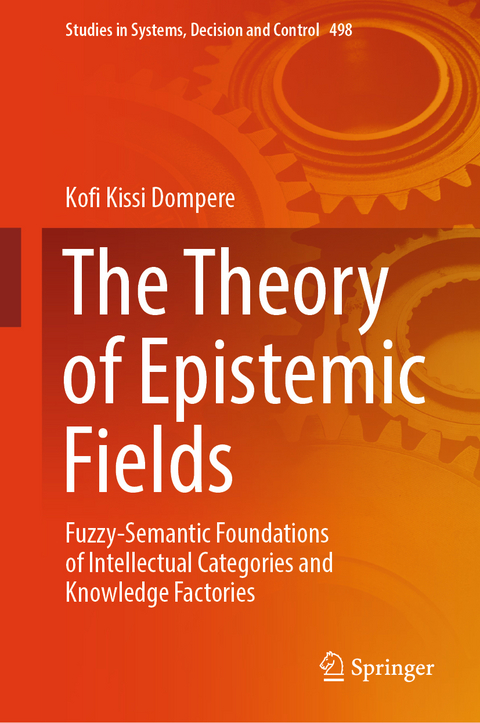
The Theory of Epistemic Fields
Springer International Publishing (Verlag)
978-3-031-42469-4 (ISBN)
The book is about the development of the theory of epistemic fields with the corresponding relational and information fields as a framework for the understanding of strategies and tactics of the theory of knowing as the production of intellectual investment flows and the theory of knowledge accumulation as the production of intellectual capital stocks in systems of factories and departments providing the foundations for the development of open algorithms in the open space of problem-solution dualities. The concepts and the roles of thinking and reasoning with curiosity, creativity, hope, Ill-posed problems, phantom problems, unsolved problems, misinformation, disinformation, fake news, and courage are introduced, defined, and analyzed on the cognitive journeys over the space of ignorance-knowledge dualities, where dualistic-polar conflicts between duals in the space of ignorance-knowledge dualities are resolved with the instruments of fuzzy optimization, the results of which are used to induced the zones of ignorance, the zones of knowledge, and the zones of contentions. A complete development of the set of connecting paths of spaces and sub-spaces is provided, where all varieties, categories, and spaces reside in dualistic-polar structures with knowledge stock viewed as a single tree with the same roots, one trunk, many branches, and a fruit cocktail. The ontological space contains the space of actual-potential dualities as the primary category of knowing, and the epistemological space contains the space of imagination-reality dualities as the derived category of knowing within the space of primary-derived dualities. The space of potentials contains the space of imaginations which contains the sub-spaces of possibility-impossibility, probability-improbability, and possibility-probability dualities with corresponding spaces of necessity-freedom and anticipation-expectation dualities leading to the conception of the possible-world-impossible-world dualities in the space of semantic-non-semantic dualities. This book is also a continuation of the sequence of my works on the theories of paradigms of thought, rationality, info-statics, info-dynamics, entropy, problem-solution dualities in self-contained mathematics and philosophy, and their relational connectivity to information, language, knowing, knowledge, cognitive practices and open maching learning relative to nominalism, and the space of construction-reduction dualities over the spaces of fundamental-applied, production-consumption, input-output, and cost-benefit dualities.
lt;p>Kofi Kissi Dompere is a professor emeritus of economics at Howard University. He holds a doctoral degree in economics, master's degree in applied mathematics, master's degree in business administration in finance, and a bachelor's degree in economics and mathematics, all degrees from Temple University in Philadelphia. He has authored several scientific and scholarly works in economics, philosophy, decision theory, and fuzzy mathematics. He is the winner of 2006 Cheikh Anta Diop Award for excellence in scholarship. He has a number of published monographs. He is a resource person for UNITAR (United Nations) and an economic consultant in the areas of cost-benefit analysis, national income accounts, development, and macroeconomics. He is the founder of The Research Institute of Information Decision and Economic Sciences (RIIDES) in which he serves as a distinguished research professor. He is an active participant in discussions on fundamental problems in physics.
Preamble.- Dedication.- Prologue.- Preface.- Acknowledgement.- Chapters.- 1. The Theory Of Epistemic Fields: Principles of Diversity, Unity and Interdisciplinary Areas of Knowing.- 2. Categorial dividedness, general analytical space, the characteristic-signal fields, the epistemic fields, therelational fields, and the information fields.- 3.The principles of diversity and unity in knowing and science.- 4.Thinking and reasoning over the space of ignorance- knowledgedualities and polarities in knowing and science.- 5. Fuzzy optimization of ignorance-knowledge relational decomposition in knowing through transversality conditions.- 6. The concepts of the space of imagination-reality dualities, possibilityand probability in the principles of diversity and unity of knowing and science in the fuzzy-stochastic space.- 7. Reflective analytics on possibility, possibility space, impossibility, impossibility space, possible and impossible worlds.- Epilogue.- Index.
| Erscheinungsdatum | 21.12.2023 |
|---|---|
| Reihe/Serie | Studies in Systems, Decision and Control |
| Zusatzinfo | LXXII, 515 p. 13 illus. |
| Verlagsort | Cham |
| Sprache | englisch |
| Maße | 155 x 235 mm |
| Themenwelt | Informatik ► Theorie / Studium ► Künstliche Intelligenz / Robotik |
| Technik | |
| Schlagworte | Cost-benefit Dualities • Epistemic Fields • Fuzzy-semantics • Info-dynamics • information fields • Info-statics • Problem-solution Duality • Relational Field |
| ISBN-10 | 3-031-42469-7 / 3031424697 |
| ISBN-13 | 978-3-031-42469-4 / 9783031424694 |
| Zustand | Neuware |
| Haben Sie eine Frage zum Produkt? |
aus dem Bereich


